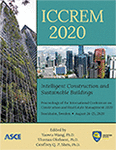International Conference on Construction and Real Estate Management 2020
Framework to Investigate Knowledge Sharing through Social Networks in Australian Construction Industry
Publication: ICCREM 2020: Intelligent Construction and Sustainable Buildings
ABSTRACT
The project-based settings in construction hinder the transfer of knowledge from one project to future projects. Knowledge management approaches suggest that new knowledge created within construction projects should pass to the organisation level and then be shared at the organisation level and transferred to future projects. Previous research had found that construction project knowledge is more likely to be disseminated through networks of strong informal relationships. Hence, it is important to build and maintain these strong networks within construction organisations to enable wider sharing of project knowledge. However, little is known on how such networks exist in construction organisations in Australia and how to enable these networks for effective knowledge sharing. Social network analysis provides a method of analysing network patterns. By using social network analysis, this research is aimed to identify and measure knowledge sharing networks within construction organisations using the case study research method by selecting several large construction firms operating in Sydney region in Australia. The paper reports on the initial phases of this study through a literature review and introduces the research framework that is adopted for future case studies.
Get full access to this article
View all available purchase options and get full access to this chapter.
ACKNOWLEDGMENTS
Kindly thank Western Sydney University for funding this research project and the participants in the Australian construction firms.
REFERENCES
Anumba, C.J. (2009). “Towards next-generation knowledge management systems for construction sector organizations – Editorial.” Construction innovation, 9(3), 245-249.
Argote, L. and Ingram, P. (2000). “Knowledge transfer: a basis for competitive advantage in firms.” Organisational Behaviour and Human Decision Processes, 82(1), 150–167.
Bresnen, M., Edelman, L., Newell, S., Scarbrough, H. and Swan, J. (2003). “Social practices and the management of knowledge in project environments.” International journal of project management, (21), 157-166.
Bresnen, M., Edelman, L., Newell, S., Scarbrough, H. and Swan, J, (2005). “Exploring social capital in the construction firm.” Building research & information, 33(3), 235-244.
Carrillo, P. (2004). “Managing knowledge: lessons from the oil and gas sector.” Construction management and economics, 22(6), 631-642.
Chinowsky, P., Diekmann, J. and Galotti, V. (2008). “Social network model of construction.” Journal of Construction Engineering and Management, 134(10), 804-812.
Chinowsky, P., Diekmann, J. and O’rien, J. (2010). “Project Organisations as Social Networks.” Journal of Construction Engineering and Management, 136(4), 452-458.
Chua, A. (2002). “The influence of social interaction on knowledge creation.” Journal of intellectual capital, 3(4), 375-392.
Coleman, J.S. (1988) “Social capital in the creation of human capital.” American journal of sociology, 94(1998), 95-120.
Connelly, C.E. and Kelloway, E.K. (2003). “Predictors of employees’ perceptions of knowledge sharing cultures.” Leadership and Organisation Development Journal, 24(5). 294-301.
Hari, S., Egbu, C. and Kumar, B. (2005). “A knowledge capture awareness tool.” Engineering, Construction and Architectural Management, 12(6), 533–567.
Filius, R., De, F.F.A. and Roelofs, E.C. (2000). “Knowledge management in the HRD office: a comparison of three cases.” Journal of Knowledge Management, 12(7), 286-295.
Goh, S.C., (2002). “Managing effective knowledge transfer: an integrative framework and some practice implications.” Journal of knowledge Management, 6(1), 23-30.
Haythornthwaite, C. (1996). “Social network analysis: An approach and technique for the study of information exchange.” Library and Information Science Research, 18(4), 323-342.
Hoffman, J., Hoelscher, M. and Sherif, K. (2005). “Social capital, knowledge management and sustained superior performance.” Journal of knowledge management, 9(3), 93–101.
Marouf, L.N. (2007). “Social networks and knowledge sharing in organisations: a case study.” Journal of knowledge management, 11(6), 110-125.
Moran, P. (2005). “Structural vs. relational embeddedness: social capital and managerial performance.” Strategic management journal, 26(12), 1129-1151.
Nahapiet, J. and Ghoshal, S. (1998). “Social capital, intellectual capital, and the organisational advantage.” Academy of management review, 23(2), 242-266.
Park, H., Han, S.H., Rojas, E.M., Son, J. and Jung, W. (2011). “Social network analysis of collaborative ventures for overseas construction projects.” Journal of Construction Engineering and Management, 137(5), 344-355.
Pathirage, C.P., Amaratunga, R.D.G. and Haigh, R. (2007). “Tacit knowledge and organisational performance: construction industry perspective.” Journal of knowledge management, 11(1), 115-126.
Pryke, S. (2012). Social Network Analysis in Construction, Chinchester, Wiley-Blackwell: West Sussex.
Pryke, S.D. (2004). “Analysing construction project coalitions: exploring the application of social network analysis.” Construction Management and Economics, 22(8), 787-797.
Ruan, X., Ochieng, E., Price, A. and Egbu, C. (2013). “Time for a real shift to relations: appraisal of Social Network Analysis applications in the UK construction industry.” Australasian Journal of Construction Economics and Building, 13, 92-105.
Senaratne, S. and Herath, D.R. (2009). “Managing Knowledge through effective sharing between construction design team members.” Proceedings from the 4th International Research Conference on Management and Finance: Competitive Management in a Dynamic World, Western Province, Sri Lanka, 841-849.
Senaratne, S. and Sexton, M. (2008). “Managing construction project change: A knowledge management perspective.” Construction Management and Economics, 26(10-12), 1303-1311
Yang, J.T. (2004). “Job-related knowledge sharing: comparative case studies.” Journal of Knowledge Management, 8(3), 118-126.
Information & Authors
Information
Published In
ICCREM 2020: Intelligent Construction and Sustainable Buildings
Pages: 651 - 657
Editors: Yaowu Wang, Ph.D., Harbin Institute of Technology, Thomas Olofsson, Ph.D., Luleå University of Technology, and Geoffrey Q. P. Shen, Ph.D., Hong Kong Polytechnic University
ISBN (Online): 978-0-7844-8323-7
Copyright
© 2020 American Society of Civil Engineers.
History
Published online: Oct 14, 2020
Published in print: Oct 14, 2020
Authors
Metrics & Citations
Metrics
Citations
Download citation
If you have the appropriate software installed, you can download article citation data to the citation manager of your choice. Simply select your manager software from the list below and click Download.
